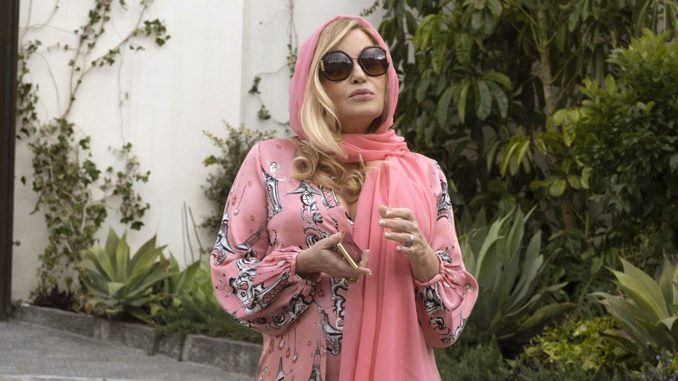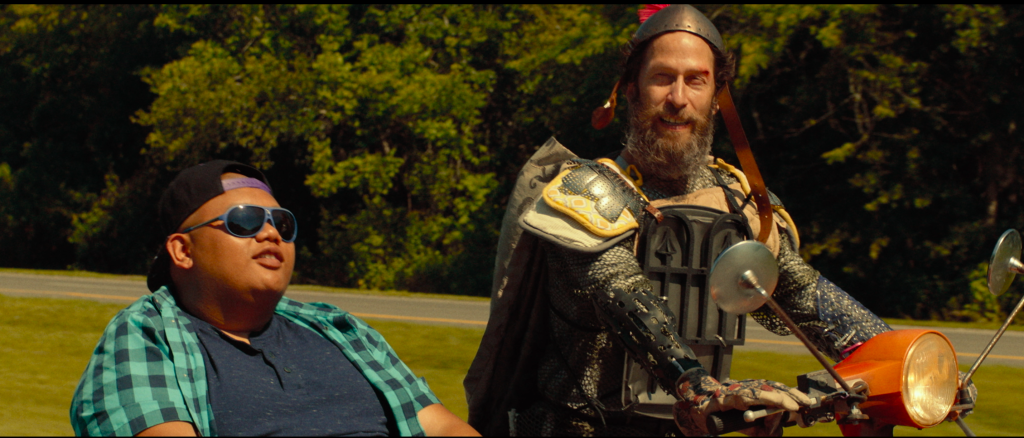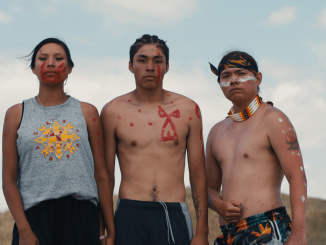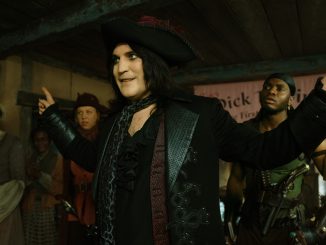
I was late getting fully started on The White Lotus (HBO Max), but upon hearing that the start of Season 2 had a reference to Chico State in it, I went directly into that season premiere, then binged all of Season 1 in the days before the new season’s second episode aired. A scrambled entry, but it didn’t take long to get me hooked.
The series is the creation of Mike White (School of Rock, Chuck & Buck, etc.). The first season is set is Hawaii, and the second moves on to southern Italy, but the central premise remains as before: a gaggle of tourists, families, lovers young and older, and assorted hangers-on caught up in a charmingly ironic series of emotional entanglements in and around a posh resort. It’s a dark-humored romantic comedy with a beguiling mixture of nuanced characterization and prickly satire.
Jennifer Coolidge, the lone major carryover from Season 1, is wonderful as a buffoonishly needy heiress in dogged pursuit of romance. But the scripts’ abiding emphasis is on incisive and antic parallels and contrasts among the characters and their relationships. Most of the characters are American, but much of it, with its undercurrents of tender irony, works brightly as an intergenerational comedy of manners, with a lively touch of continental bedroom farce. Its wry, subtly shifting perspectives on its characters make it a comedy worth taking seriously.
The English (BBC/Amazon Prime), a six-episode western set in Wyoming circa 1890, feels at times like a strange and intriguing hybrid as it comes to life in wild territory somewhere between classic westerns and Masterpiece Theatre. But, fear not, it more than makes the best of those paradoxical-sounding qualities.
As a western, it’s handsomely visualized and boldly plotted. Its Masterpiece aura is both circumstantial and crucial: The lead character and several others are English gentry, and while it’s got plenty of action and wide open spaces, its greatest dramatic power resides in superb exchanges of dialogue that sometimes seem almost Shakespearean.
Lady Cornelia Locke (an excellent Emily Blunt) has come to America to track down the man she says has killed her son. From the outset, her progress is impeded by an assortment of villains (most of them either English or Irish), but she soon makes common cause of a sort with one Eli Whipp (Chaske Spencer, also excellent), a Pawnee cavalry scout who has just finished his tour of duty when Lady Cornelia finds him held prisoner by redneck renegades. They become partners in peril, by turns protecting and/or rescuing each other. And, a seemingly predictable romance soon follows, albeit in mostly unexpected ways. The story confers hero status upon them both, but neither of them behaves like the stereotypical western hero.
British writer-director Hugo Blick has a fine cast on hand for the film’s gallery of paradoxical characters. Esteemed actors Ciarán Hinds and Toby Jones are very sharp as fearsome blackguards in the opening episode. Irish actor Stephen Rea, looking suitably uncomfortable in cowboy togs, plays an equivocating sheriff named Marshall (first name: Robert). Nichola McAuliffe plays the witchy Black Eyed Mog with eerie zest, and Rafe Spall scalds as the blighted David Melmont, another Brit run appallingly amuck in the Wild West. Gary Farmer plays a cheerfully duplicitous store owner, a Kickapoo named Clarke.
Out in the Open, a stark and gripping 2019 Spanish film (HBO Max), has been described as a “Spanish western”—which is true enough, up to a point. Set in 1946 and filmed almost entirely in the rugged terrain of Andalusia, it’s also a coming-of-age tale with elements of revenge tragedy and political parable threaded in.
The central characters are a child, a shepherd and an autocratic landowner. Known only as “the Kid,” the child is a runaway, a fledgling rebel fleeing the life of a peasant family trapped in indentured servitude. The escape runs into difficulties right from the start, but the Kid soon finds himself in the somewhat precarious company of a rough-hewn sheepherder, a gruffly philosophical loner known to the locals as “the Moor.” In his curmudgeonly avuncular way, and by fits and starts, the Moor becomes the Kid’s part-time protector, mentor and role model. All the while, Capataz, the dictatorial landowner, is in hot pursuit of the both of them, especially the Kid, whom he views as a cherished possession.
Based on a novella by Jesús Carrasco, this “western” feels a little like a compact, transplanted variation on Huckleberry Finn, but with rural post-Civil War Spain as the backdrop. Nevertheless, the Spanish tradition of the picaresque novel, with its rascals and rogue heroes, also looms large. That’s evident in the political and cultural undercurrents of the action, and director Benito Zambrano and his cast give it a special comic-dramatic intensity in the scenes where the characters, and the Kid especially, lie to each other while also trying to convey at least part of the urgent truth of the moment.

Young Jaime López is very effective as the Kid. Luis Tosar has an intense gravity as the Moor, an almost-broken man whose dignity, both fierce and humble, is unflagging. Capataz (played with smooth, chilling authority by Luis Callejo) is a superb study of an autocratic mindset fueled by a suave blend of sadism, narcissism and self-deception. The Kid’s fraught encounter with a legless beggar (Vicente Romero) at an abandoned ranch is a little masterpiece in its own right. Its surreal mixture of pathos and rage might seem a momentary resurrection of the cinema of Luis Buñuel.
In The True Don Quixote (multiple streaming services), Danny Kehoe (Tim Blake Nelson) is an adventure-loving librarian in rural Louisiana. In the midst of an emotional crisis, he becomes convinced he’s the modern incarnation of Cervantes’s Don Quixote and, with his saturnine buddy Kevin (Jacob Batalon) serving as his squire “Sancho Panza,” launches into a DIY string of Quixotic misadventures in and around the local parish. It’s a homely little indie comedy (written and directed by Chris Poche), but with special help from Nelson’s performance, it comes across with enough humor, irony and pathos to give it a quixotic vitality of its own.




Be the first to comment